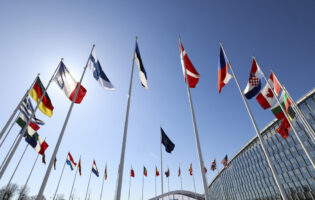Transatlantic Transitions
Trump, the EU, and the Next German Government
Germany, Europe, and the United States are on the threshold of major transitions. The start of the second Trump administration will have significant consequences for the transatlantic partnership, and the February 2025 Bundestag election will yield a new federal coalition, with a mandate and presumably with a stable majority to govern Germany for the coming four years. With war on the European continent, a changing global economy, and increasing systemic rivalry, the stakes for both of our countries could not be higher. The state of Hesse, with its extreme interconnectedness in Europe, across the global financial architecture, and as a logistical hub for the world, will also play an important role in this regard.
This event gathers leading German and American voices to offer crucial insights into the major geoeconomic and security issues that will define the agenda this year and beyond.
Panelists
Brooks Allen is lead coordinator of the firm’s international trade practice. He focuses his practice on reviews by the Committee on Foreign Investment in the United States (CFIUS) and international trade issues, including trade policy, customs, trade remedy and export control issues. Mr. Allen has experience in both private practice and government, having most recently served as assistant general counsel in the Office of the U.S. Trade Representative (USTR). Within CFIUS, Mr. Allen served as lead counsel for USTR and participated in deliberations and decision-making in hundreds of cases. He also represented USTR in drafting regulations implementing the Foreign Investment Risk Review Modernization Act of 2018 (FIRRMA) legislation, which transformed CFIUS’s procedures and mandate. Mr. Allen has been recognized by The Legal 500 as a key lawyer focusing on CFIUS and international trade issues.
Laura von Daniels is Head of Research Division “The Americas” at the German Institute for International and Security Affairs (Stiftung Wissenschaft und Politik). Her areas of expertise include the international financial system, financial and debt crisis, and foreign trade policy, with a focus on U.S. economic policy, monetary policy, trade policy, trade agreements, Investor-State Dispute Settlement (ISDS), financial crisis, and financial regulation.
Emily Margarethe Haber was German Ambassador to the United States from 2018 until 2023. Prior to her transfer to Washington, DC, she served in various leadership functions at the Foreign Office in Berlin. In 2009, she was appointed Political Director and, in 2011, State Secretary, the first woman to hold either post. Thereafter, she was deployed to the Federal Ministry of the Interior, serving as State Secretary in charge of homeland security and migration policy from 2014 until 2018. Emily Haber has many years of experience with Russia and the former Soviet Union. She held various posts at the German Embassy in Moscow, including Head of the Political Department. At the Foreign Office in Berlin, she served as Head of the OSCE Division and as Deputy Director-General for the Western Balkans, among other positions.
Arne Holzhausen is head of Economic Research’s Insurance, Wealth & ESG team at Allianz SE, Munich. He is responsible for analyzing and forecasting global insurance and pension markets, monitoring worldwide private assets and liabilities and assessing the impact of ESG issues on economic and capital market outcomes. He regularly writes on economic trends impacting insurance including low yields, regulation, technology, and demographics. Before joining Allianz in 2009, Dr. Holzhausen spent almost eight years with Dresdner Bank’s Economic Research, lastly as head of banking markets. From 1995 to 2000, he was Assistant Professor at the Centre for East Asian Studies of the Free University of Berlin. He holds a doctorate in Japanese studies and a diploma in Economics.
Penelope (Penny) Naas is a global public policy leader who designs strategies on international economic issues that sit at the nexus of geopolitics, trade, and climate. She is an adviser for TradeExperettes, a global organization of women trade experts. Naas has created innovative strategies and solutions for Citigroup and, more recently, for UPS as its president for international public affairs and global sustainability. She opened and was managing director of Citigroup’s first government affairs office in Brussels between 2007 and 2012 before leading UPS’s international team from 2012 to 2019. She started her career at the U.S. Department of Commerce, where she worked for thirteen years on international economic issues and advancing the commercial interests of US companies in Europe. Naas holds a bachelor’s degree in economics and a master’s degree in public policy from the University of Michigan, Ann Arbor. She is on several boards and has co-chaired the World Economic Forum’s Global Future Council on Trade and Investment.
Leonard Schütte is Senior Researcher at the Munich Security Conference, where he co-edits and contributes to the Munich Security Report and other publications. He holds a PhD from Maastricht University and studied in Cambridge, Oxford, St. Andrews, and Paris. In 2018-2019, he was the Clara Marina O’Donnell Fellow at the Centre for European Reform in London. Schütte has published widely on European defense, transatlantic relations, international organizations, and geoeconomics.






